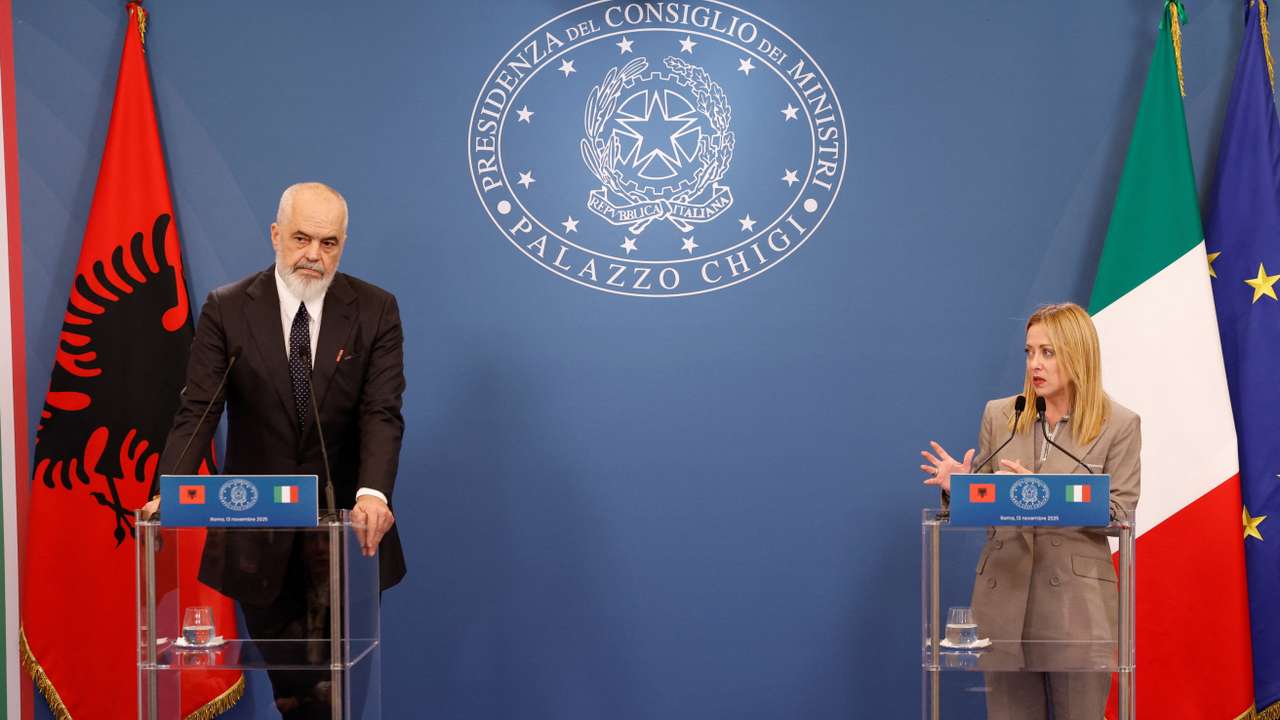Italy's Meloni vows to press on with Albania migrant camp scheme
- #Fundamental Rights
- #Civil Liberties
- #Diplomacy
- #Foreign Policy
- #East European Countries
- #Europe
- #Middle East and Africa
- #Emerging Market Countries
- #European Union
- #Euro Zone
- #Government Finances
- #Asylum
- #Immigration
- #Refugees
- #International Agencies
- #Treaty Groups
- #Judicial Process
- #Court Cases
- #Court Decisions
- #Monetary
- #Fiscal Policy
- #Policy Makers
- #government
- #Politics
- #Race Relations
- #Ethnic Issues
- #South-Eastern Europe
- #International Trade
- #Western Europe
- #Fundamental Rights
- #Civil Liberties
- #Diplomacy
- #Foreign Policy
- #East European Countries
- #Europe
- #Middle East and Africa
- #Emerging Market Countries
- #European Union
- #Euro Zone
- #Government Finances
- #Asylum
- #Immigration
- #Refugees
- #International Agencies
- #Treaty Groups
- #Judicial Process
- #Court Cases
- #Court Decisions
- #Monetary
- #Fiscal Policy
- #Policy Makers
- #government
- #Politics
- #Race Relations
- #Ethnic Issues
- #South-Eastern Europe
- #International Trade
- #Western Europe

By Angelo Amante
Italy's Prime Minister Giorgia Meloni on Thursday vowed to relaunch a plan to detain migrants in Albania, a flagship initiative of her conservative government that has been blocked by judges.
Italy and Albania signed a protocol in 2023 to take migrants caught at sea to Albania and screen their asylum requests there, in the first such deal between a European Union country and one from outside the bloc.
The scheme stalled almost immediately, after Italian courts ordered migrants to be returned to Italy, citing issues with EU law.
The EU's top court in August also ruled against the Rome government in another blow to the plan, but Meloni is confident the Albanian camps will be operational from mid-2026 when new EU rules on immigration and asylum are due to come into force.
"Many have worked to slow it down or block it, but we are determined to move forward because this mechanism has the capacity to change the entire (migration) paradigm," Meloni told a press conference in Rome with her Albanian counterpart Edi Rama.
ALBANIAN CAMPS LARGELY EMPTY
Italy hoped the Albanian camps would process and largely reject the requests of some 36,000 male asylum seekers per year, but they have been largely empty since opening in October 2024.
Since the migrants due to be taken to Albania are supposed to come from a government-drafted list of safe countries, the expectation was that most of their asylum requests would be rejected.
Meloni sees the entire scheme as a disincentive for migrants seeking to enter Italy via the Mediterranean.
After judges prevented the use of the camps as originally intended, Italy turned them into repatriation hubs for failed asylum seekers. Media reports said only a few hundred people have occupied them.
One analyst warned that legal obstacles could remain even after the new EU rules come into force, given the "exceptional" legal status of Italian-run migrant detention facilities based in a foreign country.
"I expect that even if they were to become fully operational, appeals would continue," Luca Barana, a migration expert at the Institute for International Affairs, told Reuters.
This article was produced by Reuters news agency. It has not been edited by Global South World.